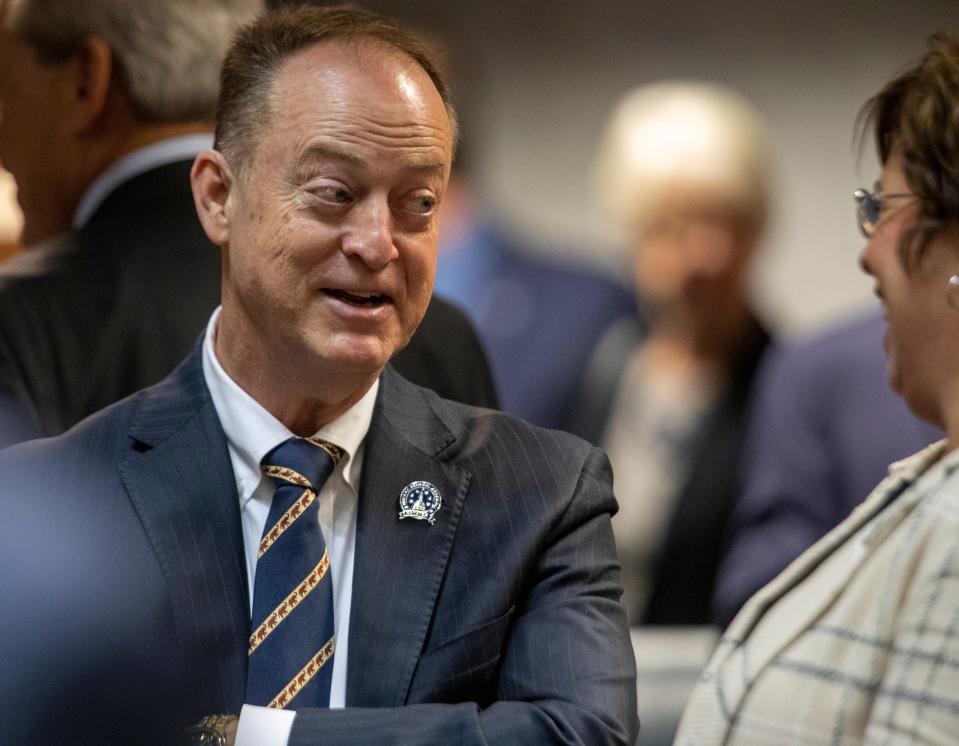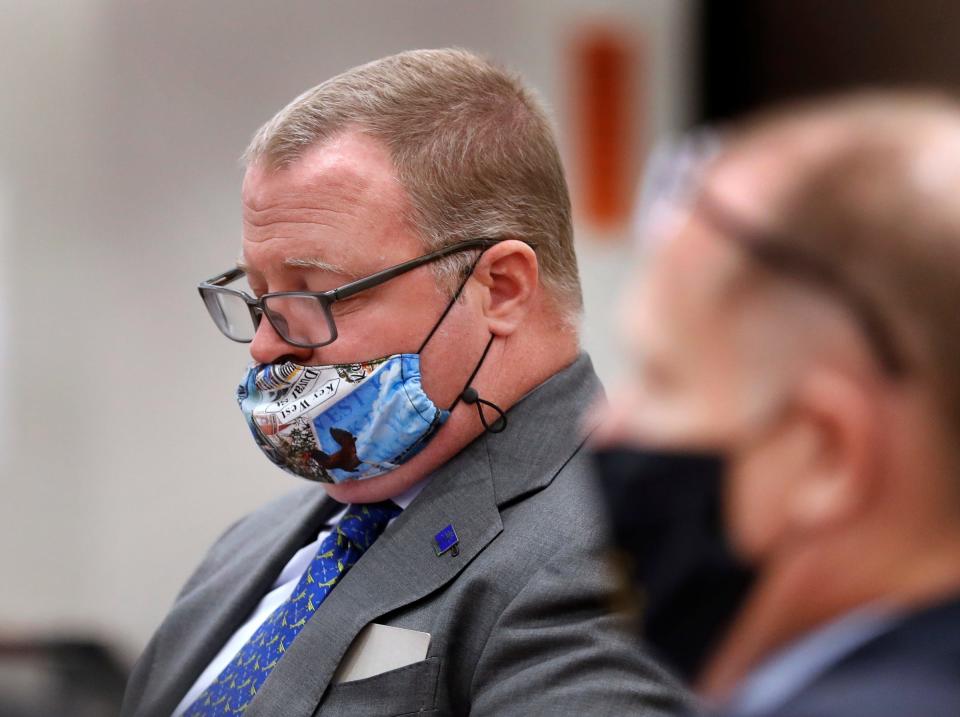Indiana one of most polluted states. New report says legislature gets a D+ on green bills.
The report cards are out, and it’s not looking good for Indiana lawmakers.
A new scorecard that grades Indiana legislators based on their votes in support of or against various environment-related bills has been released. In it, nearly two-thirds received a D or an F. Among them: the chairs of the House and Senate Environmental Affairs committees.
The Sierra Club’s Hoosier Chapter shared its report last week after the conclusion of the 2022 session. It examined votes on various energy and conservation bills dating back to the 2014 session, including the laws that phased out net metering and stripped protections for wetlands.
The environmental advocacy group believes Indiana legislators are putting the state on a dangerous path, it said, and officials are refusing to listen to the concerns of Hoosiers.
“Our frustration with inaction by the Indiana legislature has been building for years, and came to a head this session,” said Wendy Bredhold with Sierra Club’s Beyond Coal campaign in Indiana.
That frustration is what prompted the group to do this report for the first time.
“These legislators must be held accountable,” she continued, “and we want to give Hoosiers the facts about how their legislators have voted on these and other environmental matters.”
The average grade among roughly 150 state legislators is a D+, according to the report. Only one-third of them got a C or above.
The scorecard indicates that Indiana’s General Assembly does not place a priority on environmental-protecting initiatives, said Tim Maloney with the Hoosier Environmental Council.
Water quality: New report finds Indiana has the most dirty waterways in U.S. Agriculture is main culprit.
Indiana is frequently ranked among the most polluted states in the country.
According to the EPA’s Toxics Release Inventory, using data from 2020, the most recent, Indiana releases the third most chemicals and pollutants per square mile of any state. And those releases have health implications: EPA data also show that pollution poses a higher risk to public health in Indiana than in most other states.
Indiana also is one of the worst states for carbon pollution, while another report last week found that Indiana has the most dirty waterways in the U.S.
Most of the bills that would help address those issues, however, are dead in the water.
Rep. Ryan Dvorak, who serves on the House Natural Resources Committee and received an A-, said he thinks the scorecard can be a valuable tool to help Hoosiers better understand the issues.
Still, the South Bend Democrat said it’s important to include the caveat that the grades are based only on issues that “were allowed to be voted on by Republicans.”
“It’s a tiny slice of issues we even had the opportunity to actually cast a vote on,” Dvorak said. “There are so many other topics that we should be talking about and voting on. How many other big issues that people do really care about never even got the light of day?”
Indiana contamination: Indiana town was built on contaminated coal ash. Now, NIPSCO must pay $12M to clean it up
Dvorak raises a concern that is echoed by many: the lack of action by the Environmental Affairs Committees in both the House and Senate.
A total of 19 pieces of legislation assigned to the two committees this year. But only three of those bills even got a hearing: one bill in the House committee and two in the Senate.
The lack of action means bills related to lead and PFAS in drinking water, coal ash contamination, radon in schools, septic system pollution, inspections of factory farms and climate change solutions were dead in the water.

Two such bills this year would have created a task force to study the impacts of climate change in Indiana and explore solutions, while a resolution would have lawmakers merely acknowledge the existence of climate change in Indiana. Those pieces of legislation were championed by Confront the Climate Crisis, the high school youth-led group that was demanding for climate action from the legislature.
Lawmakers, however, responded with a hard "no" and didn’t hear any of those bills.
Rep. Sue Errington, the ranking minority member on the House committee, said the culture at the Statehouse is “pretty hostile to the environment.”
“Given Indiana’s ranking among the states near the bottom in terms of environmental quality, it seems like this ought to be a really active committee,” said the Muncie Democrat who earned an A on the scorecard.”
This year’s session is too familiar for many. During the 2021 session, the House Environmental Affairs committee didn’t meet at all during the first half of session — leaving 13 bills without any consideration at all.

Last year’s Senate Environmental committee did hear three bills, but all were authored by the committee chair Sen. Mark Messmer. One was the controversial bill that stripped protections for the vast majority of Indiana’s remaining wetlands.
Messmer, R-Jasper, received an F on the scorecard. He did not respond to IndyStar’s request for comment.
Rep. Mike Speedy, who chairs the House Environment committee, did not fare much better: The Indianapolis Republican received a D-.
Speedy said he helps protect small businesses from government overreach while trying to learn about potential environmental issues coming down the road — “that’s my job,” he said.
He said many of these bills “seem to emphasize an ideological viewpoint over a distinct problem and that doesn’t resonate in the majorities in the House and Senate.” Republicans have a supermajority in both chambers this year.
Still, Speedy said he tries to be a problem solver once he understands an issue, and has requested a summer study of coal ash issues. He added that if he feels he is doing his best for his district and the state and is led by his conscience, then “I can’t be distracted by grades given to me by special interest groups.”

Dvorak, however, disagreed. He said an environmental nonprofit that doesn’t stand to financially gain from any of this legislation can’t be seen as a special interest. Rather, the report shows that the legislature is out-of-step with the concerns of everyday Hoosiers, he said.
A recent Audubon Society survey found that 78% of Hoosiers believe that climate change is a threat. Nearly three-quarters of voters — regardless of political party — are in favor of expanding the use of renewable energy as well as fairly compensating customers for their rooftop solar.
Rooftop solar: New law protects Hoosier property rights, makes it harder for HOAs to say no to solar
And a 2020 statewide poll found that seven in 10 Hoosiers, including Republicans and Democrats, believe that both the state and federal government need to do more to address climate change. According to that same survey, eight in 10 respondents would prioritize protecting the environment, even if it slowed economic growth.
Amanda Shepherd, executive director of the Sierra Club’s Hoosier chapter, said these surveys confirm that a majority of Hoosiers care about issues such as clean energy, conservation and climate change.
“Yet most legislators are not taking appropriate action to address these issues,” she said. “The people of Indiana need better representation.”
That can come from shifting priorities from those in office, she said, or a shift in who is elected. She hopes the report card project, which the group plans to continue next year, will empower Hoosiers to hold their legislators accountable for these votes.
The Scrub Hub: Your questions. Our answers.
Do you have questions about the environment? IndyStar environmental reporters Sarah Bowman and London Gibson want to hear from you.
Call IndyStar reporter Sarah Bowman at 317-444-6129 or email at sarah.bowman@indystar.com. Follow her on Twitter and Facebook: @IndyStarSarah. Connect with IndyStar’s environmental reporters: Join The Scrub on Facebook.
IndyStar's environmental reporting project is made possible through the generous support of the nonprofit Nina Mason Pulliam Charitable Trust.
This article originally appeared on Indianapolis Star: New report: Indiana lawmakers flunking on environmental bills

